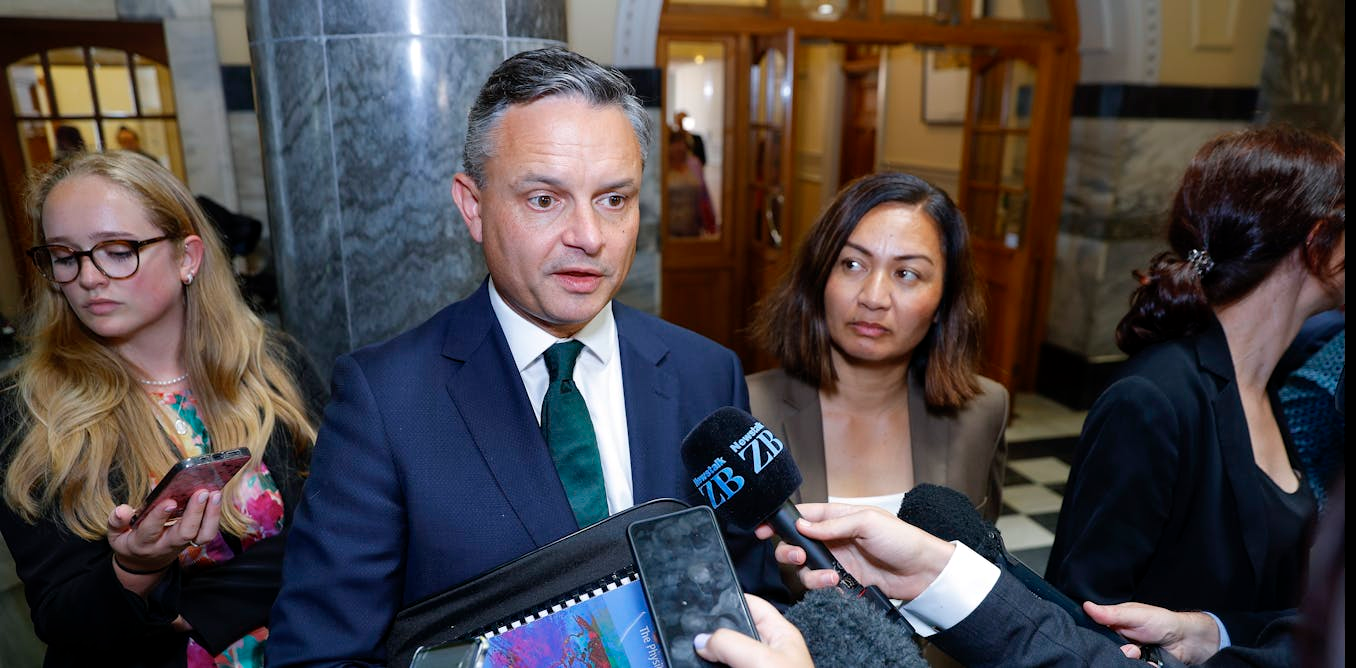Hagen Hopkins/Getty Images
The Green Party has run a strong campaign. With a 14.2% share in the latest Newshub-Reid Research poll, up by 1.9 percentage points since the previous poll, that is more than half the Labour Party’s 26.5%.
The gain seems to have come from voters unimpressed by Labour’s centrist shift under leader Chris Hipkins, which leaves the Greens to fill a wider void on the left.
The party can claim policy success in several areas – environment and climate, housing quality, family and sexual violence prevention. But has it achieved the social and economic changes required for the climate resilient society it campaigns for? The answer has to be a categorical no.
One reason is that the party continues to battle internal tensions between idealism and pragmatism.
The Greens have been a continuous presence in parliament since the start of the MMP era in 1996. But the party’s policies appear too radical for some members, and not radical enough for those who want to see fewer compromises on issues such as climate action and social justice.
Distinctive party rules
These internal tensions spilled over last year when James Shaw initially failed to get the required 75% support to be reelected as co-leader before being reinstated.
Changes to the party constitution in May last year scrapped the requirement for a male co-leader. Instead, there is now a requirement to have a Māori co-leader of any gender, along with a woman co-leader.
The Greens’ 2023 party list reflects both new talent and greater ethnic diversity than in the past.
Far more than any other political party (save Te Pāti Māori), the distinctive leadership structure and decision-making rules allow the Greens to give effect to their commitments to te Tiriti o Waitangi/Treaty of Waitangi, gender equity and grassroots democracy.
Their processes may look messy to those looking in from the outside, but it works. They keep leaders accountable and ensure they stay connected, with a driven and committed membership.
Policy success
If getting the policy architecture in place to facilitate implementation is one measure of political success, then the Greens have achieved credible action on many fronts.
Getting the 2019 Zero Carbon Act across the line with cross-party support, with the subsequent setting up of the Climate Change Commission, was certainly a success. So were the ban on new oil and gas exploration and the establishment of Ara Ake, the “future energy centre” in New Plymouth.
These and many other initiatives, reflect much required movement. But despite ambition, implementation has fallen short.
For some party insiders, the Greens’ climate agenda has been hamstrung by the ministerial responsibilities they have had under a Labour government. As critics pointed out after the 2021 UN climate summit in Glasgow, the climate change ministerial portfolio headed by a Green MP failed to reform the emissions-heavy agribusiness sector, instead focusing on reducing carbon emissions through offshore carbon credits.
Ultimately, the Greens’ policy positions on a range of issues are more radical than the outcomes that have been achieved under the Labour government.
Even many of the gains made by the Greens in forging cross-party consensus on climate action are showing signs of shrivelling away during this election campaign, with a National-ACT coalition promising to reverse most climate policy measures.
Ending poverty and tax reform
Working within the market-led political system has been a disappointment for some party supporters loyal to core Green principles. However, there is no question the Greens have shifted the terms of the debate on poverty in Aotearoa.
Reminiscent of the Nobel Prize winning economist Amartya Sen’s powerful argument that famines were caused not by natural disasters but by the absence of a functioning democracy, the Greens have positioned poverty as a political choice that no country needs to make.
The party’s Ending Poverty Together policy proposes an income guarantee that would ensure everyone, including students, receives at least NZ$385 a week after tax. Its reconfigured tax structure claims to benefit an estimated 95% of all tax payers, a much broader group than National’s proposed tax cuts would affect.
To pay for these changes, the Greens want to introduce a wealth tax of 2.5% a year on assets above $2 million per individual.
While the details of the Greens’ tax policy would undoubtedly need refining, the potential to eliminate poverty and ensure free dental care for all offers a glimpse of what truly transformational policy can look like.
The reluctance of New Zealand (the only wealthy country without any form of wealth tax) to impose fairer taxes has led to deep inequality, with devastating consequences for the poorest. As social commentator Max Rashbrooke points out in his latest book Too Much Money:
The wealthiest tenth own one quarter of the country’s assets, while the poorest half of the country has just 2%.
This situation did not just happen; it is the direct consequence of political decisions. Just as government policies previously kept inequality in check through taxes, regulations and a shared commitment to a well-funded welfare state, policy changes allowed the inequality we see now. And it is policy reform that can remedy it.
Future direction
The Green Party’s core voter base appears to be solid, ensuring it will continue its presence in parliament.
At 14.2% in the polls, the party is closing in on its highest ever level of 15%, reached in 2017 in a TVNZ poll. This was in the wake of then co-leader Metiria Turei’s revelations of misleading WINZ as a solo parent, though, and the party only achieved 6.3% in that year’s election.
If current polling holds up and translates into a significantly expanded caucus, it may allow the Greens to more actively pursue their ideals.
Even if they end up on the opposition benches, they can still remain the loudest voices on climate change and social justice. They can get issues on the parliamentary agenda, ask questions of ministers and introduce members’ bills.
They can also effectively shape public debate on unchecked economic growth – the default position of the major parties – and its resulting environmental degradation and social inequality.
The beating heart of the Green Party is their Green Charter, with its four principles of ecological wisdom, social responsibility, appropriate decision making and non-violence. This underpins the moral voice the Greens bring to a wide range of issues.
Currently, both centrist parties are showing signs of moving towards the right – away from social justice and environmental issues, for example – although in varying degrees. This leaves a void on the left for the Greens to fill, while further eroding Labour’s base.![]()
Priya Kurian, Professor of Political Science and Public Policy, University of Waikato
This article is republished from The Conversation under a Creative Commons license. Read the original article.


